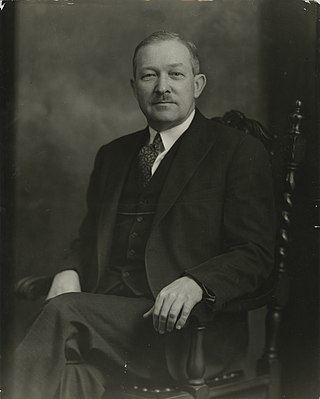
Trinity College is a private liberal arts college in Hartford, Connecticut, United States. Founded as Washington College in 1823, it is the second-oldest college in the state of Connecticut. Coeducational since 1969, the college enrolls 2,235 students. Trinity offers 41 majors and 28 interdisciplinary minors. The college is a member of the New England Small College Athletic Conference (NESCAC).
Robert Morrison MacIver was a sociologist and political scientist.

Lee Carroll Bollinger is an American attorney and educator who served as the 19th president of Columbia University from 2002 to 2023 and as the 12th president of the University of Michigan from 1996 to 2002.

Sir Cyril Norman Hinshelwood was a British physical chemist and expert in chemical kinetics. His work in reaction mechanisms earned the 1956 Nobel Prize in chemistry.

Claus Adolf Moser, Baron Moser, was a British statistician who made major contributions in both academia and the Civil Service. He prided himself rather on being a non-mathematical statistician, and said that the thing that frightened him most in his life was when Maurice Kendall asked him to teach a course on analysis of variance at the LSE.

Samuel Black McCormick was an attorney, Presbyterian clergyman, and educator who served as the third president of Coe College and the ninth Chancellor of the University of Pittsburgh.
Michael Maclagan was a British historian, antiquary and herald. He was Fellow and Tutor in Modern History at Trinity College, Oxford, for more than forty years, a long-serving officer of arms, and Lord Mayor of Oxford 1970–71.
Derek Hammond-Stroud was an English baritone opera singer best known for his performances of German lieder and his international performances in opera, particularly the roles of Alberich in Wagner's Der Ring des Nibelungen, Herr Faninal in Der Rosenkavalier and Beckmesser in Die Meistersinger von Nürnberg. He also made recordings, including a series of recordings of the Gilbert and Sullivan patter roles.
The Chancellor's Gold Medal is a prestigious annual award at Cambridge University for poetry, paralleling Oxford University's Newdigate Prize. It was first presented by Prince William Frederick, Duke of Gloucester and Edinburgh during his time as Chancellor of the University of Cambridge. In the mid 19th century, the topic for each year was sent out at the end of Michaelmas Term, with a requirement that entries were submitted by 31 March of the following year. A second requirement is and has been that poems must be submitted anonymously. Over the last few decades the system of set topics has been abandoned.
Samuel Brookner Gould (1910–1997) was an American educator prominent for promoting access to education through non-traditional means such as educational television, college teacher-mentor systems, and universities without walls. Positions he held include: the presidency of the Educational Broadcasting System (1962–64); the Chancellorship of the State University of New York (1964–70); and the chairman of the Carnegie Commission on Non-Traditional Study (1971–74).
William Alexander (Alex) Deer FRS was a distinguished British geologist, petrologist and mineralogist.

Oliver Cromwell Carmichael served as the third chancellor of Vanderbilt University from 1937 to 1946. He also served as the President of the University of Alabama from 1953 to 1957.
Charles Ion Carr Bosanquet was a Vice‑chancellor of Durham University, and the first Vice-chancellor of Newcastle University.

Ben Mark Cherrington was Acting Chancellor at the University of Denver from October 1943 to February 1946. During his term of office as chancellor he added the School of Speech and the Hotel and Restaurant Management School to the University's programs. He was the Director of the Social Science Foundation which later evolved into the Graduate School of International Studies at the University for 25 years. Cherrington was also an author of the Charter of the United Nations and a co-founder of the United Nations Educational Scientific and Cultural Organization (UNESCO). He was honored by Queen Elizabeth in 1956 for his contributions to international affairs.
Maurice Bernard Mitchell was inaugurated as the 13th chancellor of the University of Denver on October 20, 1967. Mitchell was a publishing executive and an educator. He had extensive experience in sales, broadcasting, editing, publishing, printing and administration.
Ross Pritchard served as the fourteenth chancellor of the University of Denver from 1978 to 1984.






